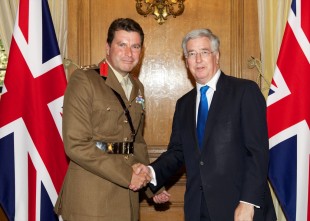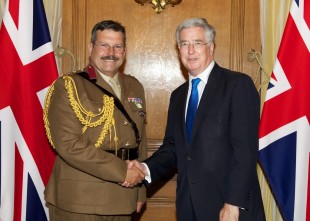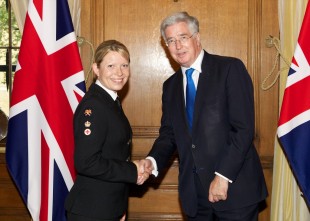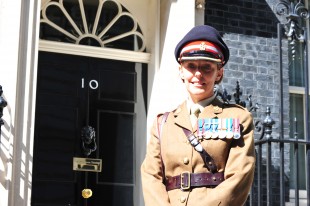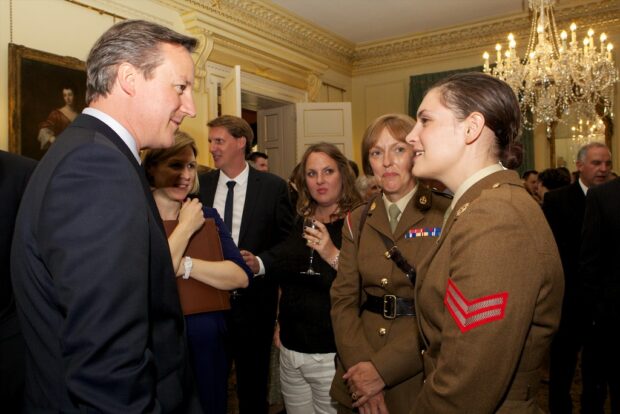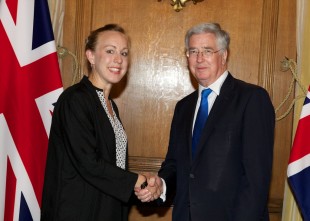Members of the Armed Forces have been presented with campaign medals this week for their efforts helping to tackle Ebola in West Africa. Here's what happened at the reception and what the recipients had to say.
On Tuesday Prime Minister David Cameron hosted military and civilian personnel at Downing Street to congratulate some of the 3,000 people who will receive a medal recognising their bravery and hard work in helping to stop the spread of Ebola. Representatives from the MOD attended alongside members of other government departments.
Prime Minister David Cameron said:
This medal is about paying tribute to the hard work of thousands of British heroes up and down the country who travelled to West Africa and put themselves at considerable personal risk.
From setting up Emergency Treatment Centres and rapid diagnostics labs, through to providing vital safety equipment training, ensuring burials happened safely and safeguarding orphans, we owe them all a debt of gratitude.
The Ebola outbreak was one of the most devastating epidemics of our generation, but as a result of their efforts many lives were saved and the outbreak contained.
When the world faced this crisis Britain and brave British medical staff, military personnel, aid workers and volunteers stepped up to the plate.
This is the first time in recent history that a medal has been created specifically to recognise those who have tackled a humanitarian crisis and is in recognition of the highly dangerous environment that workers were required to enter.
Medals have been awarded to members of the Armed Forces, NHS doctors and nurses, laboratory specialists, civil servants and non-governmental organisations.
Military personnel attending the Downing Street reception received their medals from Defence Secretary Michael Fallon.
Defence Secretary Michael Fallon, who visited Sierra Leone back in March, said:
I saw first hand the heroism that our Armed Forces are demonstrating to halt the spread of Ebola when I visited Sierra Leone. These medals recognise the bravery and commitment of all those who worked to stop this deadly virus.
Our work in West Africa continues, and we are all indebted to the incredible efforts of our people who continue to help save innocent lives at great personal risk.
The military deployment to Sierra Leone saw achievements in a number of key areas. Military engineers constructed six 100 bed hospitals and provided engineering support to a number of charities and NGOs. Separately, they also planned and implemented a "train the trainer" course which saw them up-skill nearly 5,000 local healthcare workers.
Meanwhile, military medics at the Kerrytown Treatment Unit provided specialised Ebola care and treatment to international and local healthcare workers, while the UK military also provided Command, Control and Coordination to DFiD and the Government of Sierra Leone through the Joint Inter Agency Task force HQ, the National Ebola Response Centre and nine District Ebola Response Centres.
The UK military also used their experience to implement an influence campaign, focussed on education, information and changing behaviours across the country.
Armed Forces Minister Penny Mordaunt said:
Whether responding to the Nepal earthquake or rescuing migrants in the Mediterranean, our Armed Forces make a difference around the world and it's absolutely right that we recognise them for their contribution in Sierra Leone.
Below are a few personal stories from some of those who attended the Downing Street reception:
Brigadier Stephen McMahon MBE, Royal Logistic Corps Commanded the first tranche of the military response. He deployed from September to February and was responsible for the overall command of all those deployed, including niche capabilities from all three services. His primary role was to support the Government of Sierra Leone, the UK Department for International Development and the Foreign and Commonwealth Office in bringing the spread of EVD under control.
Brigadier Stephen McMahon said:
I had such a good team around me in Sierra Leone; brilliant men and women deployed at really short notice to help bring hope to the people of Sierra Leone. The medical piece has been celebrated - and rightly so - but the engineering element was also a significant aspect. In a very short time period, military personnel had cleared six sites of jungle and built the same number of Ebola Treatment Centres, all whilst enduring the rising temperatures and humidity.
The UK military's assistance to Sierra Leone was vital, there is no doubt about it, but the reduction in the number of new cases we have seen is really the result of a team effort between MOD, our Defence Science and Technology Laboratory, DfID, PHE, Department for Health, the Government of Sierra Leone and all the NGO's in country - this list goes on.
Of course, I'm honoured to be recognised. It's wonderful for me, it's wonderful for my family; but really, I'm delighted that everyone is being recognised for what was a truly exceptional effort put in by the UK.
Brigadier Kevin Beaton, Royal Army Medical Corps, was Commander Medical in Sierra Leone. Brigadier Beaton deployed on the initial recce and subsequently for the first deployment of the operation. He provided medical oversight and command on the ground giving surety and confidence to all medics. His briefs at the operational and strategic level allowed difficult political and military decisions to be more easily made. He is a GP who has served in the Balkans, Sierra Leone, Afghanistan and Iraq. He is Commander 2 Medical Brigade and the majority of the Land Force medical troops deployed came from under his command.
Brigadier Beaton said:
I feel hugely proud and to have visited Downing Street and to have represented all of the people that have earned this really unique campaign medal.
I think I speak for everyone when I say that I am very touched that the Prime Minister invited us to his home such a special event but I am also very keen to remember that are equally many others who are just as deserving.
Petty Officer Naval Nurse Elizabeth Charlotte Meatyard, Queen Alexandra's Royal Navy Nursing Service is a qualified Intensive Care specialist nurse who joined the service on 3 February 2003. She deployed to Sierra Leone on board RFA Argus where she worked in the Role Two hospital, acting as an "insurance policy" for the other deploying personnel.
Petty Officer Naval Nurse Meatyard said:
I'm extremely lucky to have had experience of land and sea during Op Gritrock. Having entered Sierra Leone, I augmented to 22 Field Hospital as a lead nurse. We set up the Intensive Care Unit within the Role Two medical facility in the ISAT, an essential medical facility required to provide an insurance policy in case of injury, non-Ebola related illness or trauma to UK entitled personnel. Once set up, it provided confidence to increase the number of UK personnel on the ground, enabling work to start at full capacity, supporting local infrastructure and building the Ebola Treatment Units.
I later transferred to the medical facilities within RFA Argus in order to increase the Role Two capability on land whilst balancing the skill mix.
Remembering all the other individuals who played essential roles in Sierra Leone during our efforts to tackle Ebola - especially those working with courageous compassion within the Ebola Treatment Units - I feel very bashful and humbled to have been invited to Number Ten. However, I'm sincerely grateful for this once in a lifetime experience, marked with a medal and never to be forgotten.
Lieutenant Colonel Alison McCourt, Queen Alexandra's Royal Army Nursing Corps, commanded the UK Military run Ebola Treatment Unit in Kerrytown. This facility was on the same site as the Save the Children facility and through Lieutenant Colonel McCourt's leadership she ensured that the two sites could run as harmoniously, reinforcing each other and delivering the best possible outcomes from both, despite some rocky and very stressful situations. She deployed for six months, returning to UK to assist in delivering the most up to date training to each of the rotations of the medical staff who were deployed.
She has recently promoted to Colonel as a result of her performance as CO of 22 Field Hospital.
Lieutenant Colonel Alison McCourt said:
The thing that really struck me being in Sierra Leone was the contrast with my usual job and in particular my usual working conditions. The heat and the humidity, coupled with the stress of potentially contracting a life threatening disease made for an incredibly demanding tour. Despite this however, the morale of the team in country was fabulous. Any departmental rivalry fell away and everyone worked so hard, all sharing the same goal which was to beat Ebola as quickly as possible. It was such a rewarding experience to help a country in such desperate need and being able to make such a big difference.
It's lovely to be recognised in this way and it's so heart warming for our families who watched the UK's progress in Sierra Leone in combatting the disease on the television or read about it in the papers.
Corporal Anna Cross is a reservist with the Queen Alexandra's Royal Army Nursing Corps in Cambridge. Corporal Cross deployed to work in the Kerrytown Treatment Unit as a nurse. She contracted Ebola and was medically evacuated back to the UK. On landing at RAF Northolt she was taken to the Royal Free Hospital in London and became the first patient to undergo successful treatment with MIL 77. She has since made a full recovery.
Corporal Anna Cross said:
The conditions in theatre were not what we were used to. It was really hot anyway, and then you had to put your personal protective equipment on! The frustrating thing was that, due to the heat, we could do so little at a time. You'd push yourself to your limit because there was so much to do, but the heat was definitely frustrating, although we knew it'd be one of the challenges when we deployed. The positive was that our facility was one of the best run in the area. So we knew that our patients, if they had any chance of survival, were in the right place.
At Downing Street this week it was amazing to see so many people from different departments who made the UK's effort happen - particularly how many highly ranked individuals! I am very proud and honoured to have been part of such a great effort.
Laura Marshall was one of 12 microbiologists from the Defence Science and Technology Laboratory (Dstl) who deployed to Sierra Leone to work in Public Health England's (PHE) Diagnostic Laboratory within the Kerry Town treatment centre. Laura and her colleagues were responsible for receiving test results from patients and diagnosing whether they had the deadly disease or not. Laura wrote a blog on her own experience in Sierra Leone, which can be read here.
Follow us on Twitter and don’t forget to sign up for email alerts.

